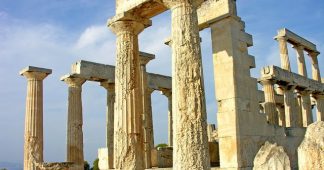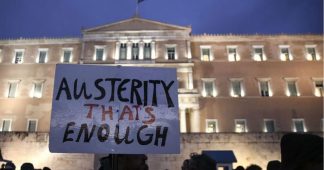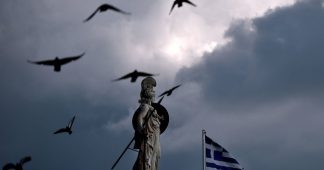19/05/2016
The first function of the European movement DIEM25, entitled “Basic Facts about the Debt”, was held in Aegina on Sunday 15th May in the rooms of the Aegina Women’s Association. After the introduction by Mr. Wayne Hall, who presented the movement and its goals, there were two very interesting talks from the economist Mr. Athanasios Contargyris and from the Aeginetan Mr. Nikos Stroblos, former National Accounts director of the Hellenic Statistical Service. Both of them were members of the Truth Commission on the Debt which operated from April to June 2015 and submitted a preliminary report with its findings. The Mayor of Aegina Mr. Dimitris Mourtzis and the municipal councilor Mr. George Skaltsiotis were both present at the meeting.
Mr. Athanasios Contargyris gave the timeline: prior to the arrival of the memoranda the debt was in the order of 100% of GNP, making it a borderline case. 70% of that consisted of interest on loans that had accumulated since 1980 and the remaining 30% was the result of public debt, chiefly attributable to defense expenditures. Greek defense expenditure is twice the European average, primarily because of our geographical position and the fact that the European Union does not guarantee its external borders, though it has been asked to do so by all Greek governments. But corruption, unfortunately, does also play a role.
So, if half of the defense expenditure is subtracted, we see that prior to the memoranda we were, in terms of debt, at the same level of public expenditures as the majority of European states. Therefore, with the exception of defense, we did not have a bloated state sector as some maintain. We did however have a clientelistic state, with the result that we did not enjoy the same level of public services as other countries. There were also serious deficiencies in tax collection and the payment of insurance contributions by employers. Finally there was the additional problem of the deficit in the balance of payments for Goods and Services.
2007 brought the economic crisis which had started in the USA. The GDP started to fall, so that there was a change in the percentage of the debt. From 100% it rose to 125% and the alarm was sounded. The “Markets” dug in their heels and stopped lending to us. Europe, for its part, did not provide the assistance of an initial declaration of support. Panic broke out in the banks on account of the consumer loans to which had left them increasingly overextended since 2000. These loans were now proving difficult to service.
The initial goal of the memoranda had been to save the banks, which were now endangered by indebtedness from consumer loans. Henceforth all the measures that were taken were deflationary in their consequences. GDP fell by 25%, while the debt remained the same at 300 billion euros. But the percentages changed: the ratio of debt to GDP rose to 180%.
The only possible solution is a haircut for the debt, which is no longer viable because it cannot be serviced. This was Mr. Contargyris’ conclusion and he proposed that DIEM25 and Greek citizens should on the one hand focus on that goal and on the other try to reduce defense expenditure by securing some European guarantees.
Mr. Νikos Stroblos, former National Accounts Director for our Statistical Service, spoke to us about what is called “Greek statistics” which, as he explained, is not the fault of the Statistical Service but of the governments of the time. He analysed the consequences of the “swaps” that were made with Goldman Sachs in 2001 so that we could go into the euro, the consequences of the revision of the public debt by the new government in 2009 and finally the bad handing of the delivery time of military weapons systems that led in turn to further expansion of the deficit in 2009, with the result that the markets stopped lending to us and we ended up with the IMF loans and the memoranda.
Vasso Kanellopoulou











